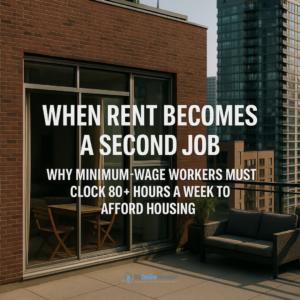The dream of working hard, paying the bills, and still having time to enjoy life feels out of reach for many Americans. For millions of minimum-wage workers, simply keeping a roof over their heads requires a grueling schedule that resembles holding down two full-time jobs.
A recent analysis published by Realtor.com reveals a sobering reality: in several U.S. cities, minimum-wage workers must work 80-94 hours per week just to afford rent while staying within the widely accepted affordability standard of spending no more than 30% of their income on housing. That means sacrificing personal time, health, and in many cases, even basic needs, just to make rent.
Full article here: Realtor.com
The Harshest Cities for Renters
The report highlights a number of cities where the math for renters simply doesn’t add up. Take Philadelphia, where the federal minimum wage of $7.25 per hour hasn’t budged in over a decade. With median rent hovering around $1,771 for a 0–2 bedroom apartment (shared by two roommates), workers need to put in 94 hours every week to meet affordability guidelines.
Other cities near the top of the list include:
-
Milwaukee, WI – 88 hours per week
-
Atlanta, GA – 84 hours per week
-
Charlotte, NC – 81 hours per week
-
Nashville, TN – 81 hours per week
-
Pittsburgh, PA – 79 hours per week
-
Raleigh, NC – 79 hours per week
-
Boston, MA – 77 hours per week (despite having a $15/hr minimum wage)
-
Austin, TX – 77 hours per week
-
Dallas, TX – 77 hours per week
For renters in these areas, working one full-time job simply isn’t enough. Housing affordability has turned into an almost impossible challenge.
Where Rent is More Doable
Not all cities paint such a bleak picture. In places where local governments have increased minimum wages or where rent growth has stabilized, workers face far fewer hours to meet housing costs.
For instance:
-
Denver, CO – 36 hours per week
-
Minneapolis, MN – 36 hours per week
-
Seattle, WA – 37 hours per week (helped by a minimum wage of $20.76/hr)
-
St. Louis, MO – 38 hours per week
-
Phoenix, AZ – 39 hours per week
-
Kansas City, MO – 39 hours per week
-
Portland, OR – 40 hours per week
-
Detroit, MI – 40 hours per week
-
Chicago, IL – 41 hours per week
-
Sacramento, CA – 44 hours per week
These numbers, while still high, fall closer to a standard full-time job showing the difference that higher minimum wages and more moderate rental markets can make.
Why the Disparity?
Two key forces drive the wide gap between cities:
-
Wage Policy – States and cities that set higher minimum wages create more breathing room for workers. Seattle is a prime example, where a higher hourly pay significantly reduces the burden.
-
Rental Market Trends – In cities with booming populations and limited housing supply, rents have outpaced wage growth. Even with higher pay, like in Boston, housing remains unaffordable because of sky-high demand.
In short, raising wages helps, but without controlling rent growth, the imbalance persists.
The Bigger Picture: Affordability in Crisis
This affordability crisis underscores a structural problem in the U.S. housing market. While median rents nationally have shown signs of leveling off in 2025, the gap between wages and housing costs remains massive for minimum-wage earners.
Workers are forced to make tough decisions:
-
Taking on multiple jobs, often at the cost of rest and family life.
-
Skipping healthcare, education, or savings to pay rent.
-
Living in overcrowded units or unsafe housing conditions just to cut costs.
Experts warn that without coordinated action such as raising minimum wages, building more affordable housing, and expanding rental assistance millions of working Americans will remain trapped in a cycle where work is no longer enough to provide basic stability.
The Takeaway
For many Americans, rent has become a second job. Cities like Philadelphia, Milwaukee, and Atlanta highlight just how unsustainable the situation is, with workers forced to put in 80 to 94 hours a week simply to afford housing.
At the same time, examples from Seattle, Minneapolis, and Denver show that change is possible when wages are raised and housing costs are managed.
The housing affordability debate isn’t just about economics it’s about dignity, opportunity, and the future of work in America. Until wages and rents realign, the question remains: how long can workers afford to keep working this hard just to survive?
Source
This blog post is based on the article: Realtor.com – “10 Cities Where Minimum Wage Workers Must Work 80 Hours for Rent”.

